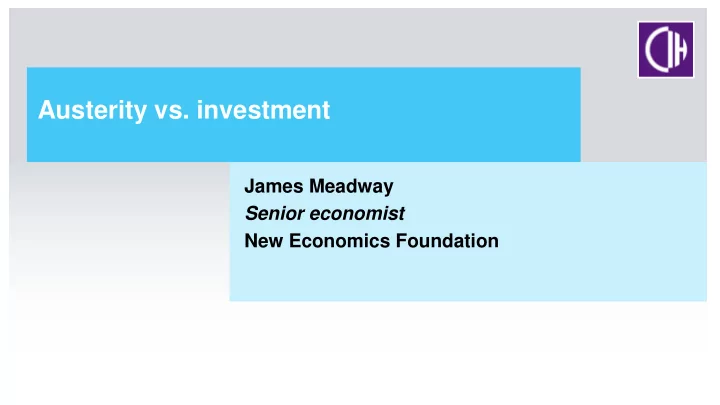

Austerity vs. investment James Meadway Senior economist New Economics Foundation
Current UK situation Double dip recession – Two consecutive quarters of negative growth – Further decline in manufacturing output Long-term unemployment highest for 16 years Austerity measures about 11% completed Widening government deficit – February 2011: £4.3bn – February 2012: £11.1bn Business investment fallen £43bn since 2008 – Drop in household spending steeper than previous recessions
Last five UK recessions
Long-term trends Median real incomes stagnant or falling – Forecast to fall 7% this year Inequality increasing over three decades – Fastest rate of increase in OECD group of developed countries Productivity growth is weak – Gap with US, France and Germany is widening Public sector responsible for 56% of jobs created since c.1980 – Manufacturing employment fallen 4m – Not replaced by private sector work
Austerity and stagnation Austerity lesson known since 1930s – One person’s spending is another’s income: the multiplier effect – If nobody spends, nobody sells Evidence across Europe is compelling – Greece, Spain, Ireland, Portugal… Driver for UK recession is collapse in spending – Households retrench, business sit on cash – Exports do not recover: depreciation has not closed trade deficit – …and then government also attempts to cut Worst single policy to follow is austerity
Prospects for recovery Essentially nonexistent in the short-term – Short of miracle, will not happen while austerity is in place Legacy of low investment by businesses over decades – c.16% GDP, 1979-2009, below comparator countries Infrastructure is chronically poor – Dieter Helm estimate: £500bn needed over 10 years to meet comparable Western European standards 70% GDP in low-growth sectors (Tim Morgan, 2011) …but is government a problem?
UK government taxes and revenues, 1979-2010 £bn 100 200 300 400 500 600 700 800 0 1979-80 1980-81 1981-82 1982-83 1983-84 1984-85 1985-86 1986-87 1987-88 1988-89 1989-90 1990-91 1991-92 1992-93 1993-94 1994-95 1995-96 1996-97 1997-98 1998-99 1999-00 2000-01 2001-02 2002-03 2003-04 2004-05 2005-06 2006-07 2007-08 2008-09 2009-10 2010-11 Spending Taxes
UK national debt, 1692-2010 300 250 200 %GDP 150 100 50 0 1692 1712 1732 1752 1772 1792 1812 1832 1852 1872 1892 1912 1932 1952 1972 1992
Taxation and public spending, 1978-2010 50.0 %GDP 40.0 Spending Taxes 30.0
Current aggregate taxation not excessive Total tax burden comparable to developed nations – OECD average, 2008: 34.4% GDP – UK, 2008: 38.6% GDP • Down from 40.4%, 1979-1997 – Corporation Tax at 22%... • 18% lower than the US; 16% lower than Japan; 8% lower than Germany But the burden is not distributed fairly – Evasion estimated at £70bn a year – Bottom fifth households pay c.40% income in tax – Top fifth households pay c.35% income tax
Cannot rely on private sector growth alone UK’s cumulative problems are huge But a simple retreat of government is unlikely to work – Estimate 600,000 government jobs to go… – …but private sector is historically poor at creating employment “Rebalancing” is not happening – Inequality rising – Manufacturing currently falling Scale of change needed is immense
The burden of debt
No return to old growth model “Growth” of previous decade did not deliver Rises in GDP did not turn into rising real median incomes Expansion of finance attempts to compensate – Consumer borrowing – Growth of the City of London Physical and environmental impacts – Rising commodity prices – Climate change But private sector alone unlikely to deliver change… … and nor can government continue as before
Transfer payments as share of UK government spending, 1978-2010 45% 40% 35% 30% 25% 20%
Public action can take a lead More intelligent spending needed – Tax-and-transfer not enough – Implicit guarantees for finance must go Scale of challenge requires direct intervention and industrial policy – East Asia, Finland – Direct role for government in driving innovation – Implicit UK industrial policy in pharmaceuticals, aerospace Alongside transformation of finance… – …and related efforts to reduce inequality …and actions to reduce environmental impact
Conclusion Austerity is failing, and was always going to “Austerity plus” or scorched earth is based on faith Government has failed, but size as such is not its failure Intervention and industrial policy can and should be used Adam Smith: economics as a moral science – Choices reflect values – Political discussion matters
Recommend
More recommend